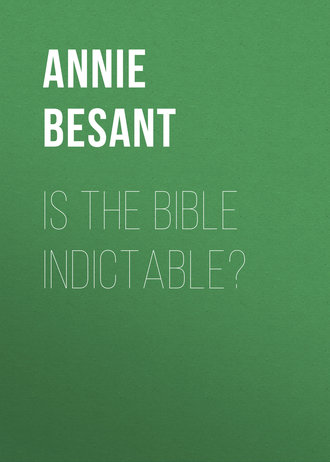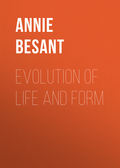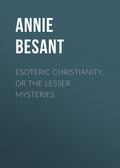
Annie Besant
Is the Bible Indictable?
As to the motives of the writers, we need not trouble about them. The law now says that intention is nothing, and no desire to do good is any excuse for obscenity (Trial, p. 257).
There remains the vital question: is the effect of some of its passages to excite and create demoralising thoughts? (Trial, p. 261).
The difficulty of dealing with this question is that many of the quotations necessary to prove that the Bible comes under the ruling of the Lord Chief Justice are of such an extremely coarse and disgusting character, that it is really impossible to reproduce them without intensifying the evil which they are calculated to do. While I see no indecency in a plain statement of physiological facts, written for people's instruction, I do see indecency in coarse and indelicate stories, the reading of which can do no good to any human being, and can have no effect save that of corrupting the mind and suggesting unclean ideas. I therefore refuse to soil my pages with quotations, and content myself with giving the references, so that anyone who desires to use the ruling of the Lord Chief Justice to suppress the Bible may see what certainty of success awaits him if justice be done. I shall not trouble about simple coarseness, such as Gen. iv. 1, 17, 25; Gen. vi. 4; or Matt. i. 18–20, 25. If mere coarseness of expression were to be noted, my task would be endless. But let the intending prosecutor read the following passages. A little boy of 8 or 10 would scarcely be improved by reading Gen. ix. 20–25; the drunkenness, indecency, and swearing in these six verses is surely calculated to corrupt the boy's mind. The teaching of Gen. xvi. 1–5 is scarcely elevating for the “common people,” seeing the example set by the “friend of God.” Gen. xvii. 10–14 and 23–27 is very coarse. Would Gen. xix. 4–9 improve a young maiden, or would it not suggest the most impure thoughts, verse 5 dealing with an idea that should surely never be put into a girl's mind? The same chapter, 30–38, is revolting; and Deut. ii. 9 and 19 implies God's approval of the unnatural crime. The ignorance of physiology which is thought best for girls would receive a shock, when in reading the Bible straight through, the day's portion comprised Gen. xxv., 21–26. Gen. xxvi., 8 is not nice, nor is Gen. xxix., 21–35, and Gen. xxx. The story of Dinah, Gen. xxxiv.; of Reuben, Gen. xxxv., 22; of Onan, Gen. xxxviii., 8–10; of Judah and Tamar, xxxviii., 13–26; of the birth of Tamar's children, xxxviii., 27–30, are all revolting in their foulness of phraseology. Why the Bible should be allowed to tell the story of Onan seems very strange, and the “righteousness” of Tamar (v. 26) wins approval. Is this thought purifying teaching for the “common people”? The story of Joseph and Potiphar's wife, Gen. xxxix., 7–18, I have heard read in church to the manifest discomfort of some of the congregation, and the amusement of others, while Joseph flying from temptation and leaving his garment with Potiphar's wife is a picture often seen in Sunday schools. Thus twelve out of the fifty chapters of Genesis are undeniably obscene, and if there is any justice in England, Genesis ought to be suppressed. We pass to Exodus. Ex. i., 15–19 is surely indecent. I am not dealing with immoral teaching, or God's blessing on the falsehood of the midwives (20, 21) would need comment. Ex. iv., 24–26, is very coarse; so also Ex. xxii., 16, 17, 19. Leviticus is coarse throughout, but is especially so in chaps. v., 3; xii.; xv.; xviii., 6–23; xx., 10–21; xxii., 3–5. The trial of jealousy is most revolting in Numb. v., 12–29. Numb. xxv., 6–8 is hardly a nice story for a child, nor is that of Numb. xxxi., 17, 18. Deut. xxi., 10–14 is not pure teaching for soldiers. Deut. xxii., 13–21 is extremely coarse; the remainder of the chapter comes also within the Chief's ruling, as do also chaps. xxiii., 1, 10, 11; xxv., 11, 12; xxvii., 20, 22, 23; xxviii., 57. The fault of the book of Joshua lies chiefly in its exceeding brutality and bloodthirstiness, but it, also, does not quite escape the charge of obscenity, as may be seen by referring to the following passage: chap. v., 2–8. Judges is occasionally very foul, and is utterly unfit for general reading, according to the late definition; Ehud and Eglon, Judges, iii., 15–25, would not bear reading aloud, and the story might have been told equally well in decent language. Or take the horribly disgusting tale of the Levite and his concubine (Judges xix.), and then judge whether a book containing such stories is fit for use in schools. Dr. Carpenter's book may do good there, because, with all its plain speaking, it conveys useful information; but what good – mental, physical, or moral – can be done to a young girl by reading Judges xix.? And the harm done is intensified by the fact that the ignorance in which girls are kept surrounds such a story with unwholesome interest, as giving a glimpse into what is, to them, the great mystery of sex. The story of Ruth iii. 3–14 is one which we should not like to see repeated by our daughters; for the virtue of a woman who should wait until a man was drunk, and then go alone at night and lie down at his feet, would, in our days, be regarded as problematical. 1 Sam. ii. 22, and v. 9 are both obscene; so are 1 Sam. xviii. 25–27 and xxi. 4, 5. 1 Sam. xxv. 22, 34 are disgustingly coarse, and there are many similar coarse passages to be found in “holy” writ. 2 Sam. vi. 14, 16, 20, is a little over-suggestive, as is also 2 Sam. x. 4. The story of David dancing is told in 1 Chron. xv. 27–29 without anything offensive in its tone. The story of David and Bathsheba is only too well known, and as told in 2 Sam. xi. 2–13 is far more calculated to arouse the passions than is anything in Knowlton. The prophecy in 2 Sam. xii. 11, 12, fulfilled in xvi. 21, 22, is repulsive in the extreme, more especially when we are told that the shameful counsel was given by Ahithophel, whose counsel, “which he counselled in those days, was as if a man had inquired at the oracle of God.” If God's oracles give such counsel, the less they are resorted to the better for the welfare of the state. We are next given the odious story of Amnon and Tamar (2 Sam. xiii. 1–22), instructive for Lord Sandon's boys and girls to read together, as they go through the Bible from beginning to end. 1 Kings i. 1–4 conveys an idea more worthy of George IV. than of the man after God's own heart. In 1 Kings xiv. 10, the coarseness is inexcusable, and verse 24 is only too intelligible after Judges xix. 2 Kings ix. 8, xviii. 27, are thoroughly Biblical in their delicacy. 1 Chron. xix. 4 repeats the unpleasant story of 2 Sam. x. 4; but both 1 and 2 Chronicles are, for the Bible, remarkably free from coarseness, and are a great improvement on the books of Kings and Samuel. The same praise is deserved by Ezra and Nehemiah. The tone of the story of Esther is somewhat sensual throughout: the drunken king commanding Vashti to come in and show her beauty, Esther i. 11; the search for the young virgins, Esther ii. 2–4; the trial and choice, Esther ii. 12–17, these are scarcely elevating reading; Esther vii. 8 is also coarse. To a girl whose safety is in her ignorance, Job iii. 11 is very plain. Psalm xxxviii. 5–7 gives a description of a certain class of disease in exact terms. Proverbs v. 17–20 is good advice, but would be condemned by the Lord Chief Justice; Proverbs vi. 24–32 is of the same character, as is also Proverbs vii. 5–23. The allusion in Ecclesiastes xi. 5 would be objected to as improper by the Solicitor-General.




